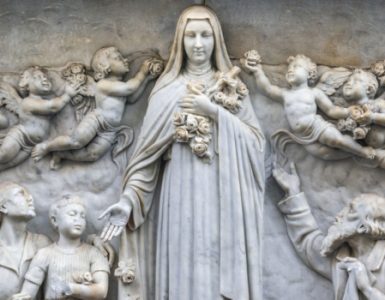St. Ignatius of Antioch —whose feast day the Church celebrates today—was the third bishop of Antioch. He was said to have heard the preaching of St. John the Apostle and he was sentenced to die under the Emperor Trajan. He was martyred by being torn apart by wild beasts circa 110 A.D.
During his imprisonment, he wrote multiple letters to various Christian communities. One of the common threads of the letters he wrote during his imprisonment was his repeated appeal for prayers. He requested prayers from his brothers and sisters in Christ so that he could persevere in what Christ was asking of him. He also asked them to accept his call to martyrdom.
In our cynical post-modern age, many people mock those who rely on prayer. Whenever a tragedy strikes and Christians offer their thoughts and prayers, many people respond with hostility. A prayerful response in the face of widespread disaster, destruction, or suffering is seen as empty, hollow, or futile. Prayer is seen as nothing in the face of material action, donating money, or showing solidarity in social media.
This increased animosity towards prayer as a response to tragedy,
demonstrates a culture that no longer believes in God. It is assumed that our
prayers fall on deaf ears in the vastness and emptiness of the universe. Our
contemporaries do not see prayer as having any tangible impact or the ability
to change a situation when something has happened or is about to happen. Those
of us who live as disciples of Christ know that prayer means everything and it
does change people, situations, events, and our own hearts.
St. Ignatius of Antioch knew that his martyrdom was imminent. He
resigned himself to live in accordance with God’s will for his life, which he
knew meant dying a violent, horrific death. He asked the communities he
instructed to allow his martyrdom to take place and not to intervene. He knew
that those who loved him would be opposed to his martyrdom, but he beseeched
them to accept this manner of his death since it was in union with Christ
Crucified. He wrote to the Romans:
“I am writing to all the Churches and I
enjoin all, that I am dying willingly for God’s sake, if only you do not
prevent it. I beg of you, do not do me any untimely kindness. Allow me to be
eaten by the beasts, which are my way of reaching to God. I am God’s wheat, and
I am to be ground by the teeth of wild beasts, so that I may become the pure
bread of Christ.”
Martyrdom can be a difficult calling for many to understand. St.
Peter and the Apostles struggled to understand that Christ had to die on the
Cross. St. Ignatius asked his brothers and sisters to let God’s will be done.
Instead of intervening, he asked them for prayers from which he can draw
sustenance. He did not want to turn from the path that God has called him to,
but he needed the strength that comes from the prayers of the Church.
It is through our prayers that we are able to strengthen one
another on the journey. While the world may mock us for what seems to be an
exercise in futility, those who live by faith know that our intercessory
prayers for one another are one of the primary ways Christ works throughout His
Mystical Body and in the world. He seeks to draw us closer to Himself and one
another through prayer. By our prayers for others, Christ strengthens,
comforts, and at times, heals those who are suffering, sick, victims of
violence, natural disasters, or other afflictions.
It is this power that comes from prayer that St. Ignatius of
Antioch sought from the Church in his final days. St. Ignatius writes to the
Philadelphians:
“My brethren, I am overflowing with love for you, and exceedingly joyful in watching over you. Yet, not I, but Jesus Christ: and in chains for His sake, I am the more fearful because I am not yet perfected. Your prayer, however, will make me perfect for God, so that I may win the lot which has mercifully fallen to me.”
St. Ignatius requested the prayers of his brothers and sisters in
Christ because he knew that through their prayers God would make up for what he
lacked. The graces unleashed through prayer can never be underestimated and it
is often the means by which God perfects those who are preparing for death,
need conversion, fight an affliction, find hope in tragedy, or even renew the
clergy and the Church. St. Ignatius knew that it is the Sacraments and prayer,
grounded in the love of Christ, that would help him persevere when his hour
came and he must be torn apart as a martyr. This is a testament to the true
power of prayer in a cynical age.
Do we ourselves know that prayer can strengthen others and even
be the means through which Christ works and acts in other people’s lives and
situations? Do we trust in Christ when we pray on behalf of others and for our
own supplications? Far too often we set aside prayer for action when we would
accomplish more in an hour of prayer than we could in weeks of fruitless work
or worry. Work without prayer often becomes empty and becomes fruitful when it
is united to frequent and fervent prayer.
If prayer can strengthen a bishop to become a martyr, imagine what it can do in our own age. Despite the mockery we face through responding to suffering in prayer, we know that God will answer our prayers in accordance with His will. We know that prayer unleashes tremendous graces in a manner that simply sending a case of water, donating money, or protocols cannot do. Material support is good and we must serve those who are suffering, but more than anything we need to be a people of intense prayer who trust in God with the faith of a child. St. Ignatius of Antioch went to his death trusting in the power of prayer, we must learn to do the same in our world today.
image: 17th century ikon of St. Ignatius and his Martyrdom, Иоанн Апакасс (?) [Public domain], via Wikimedia Commons












